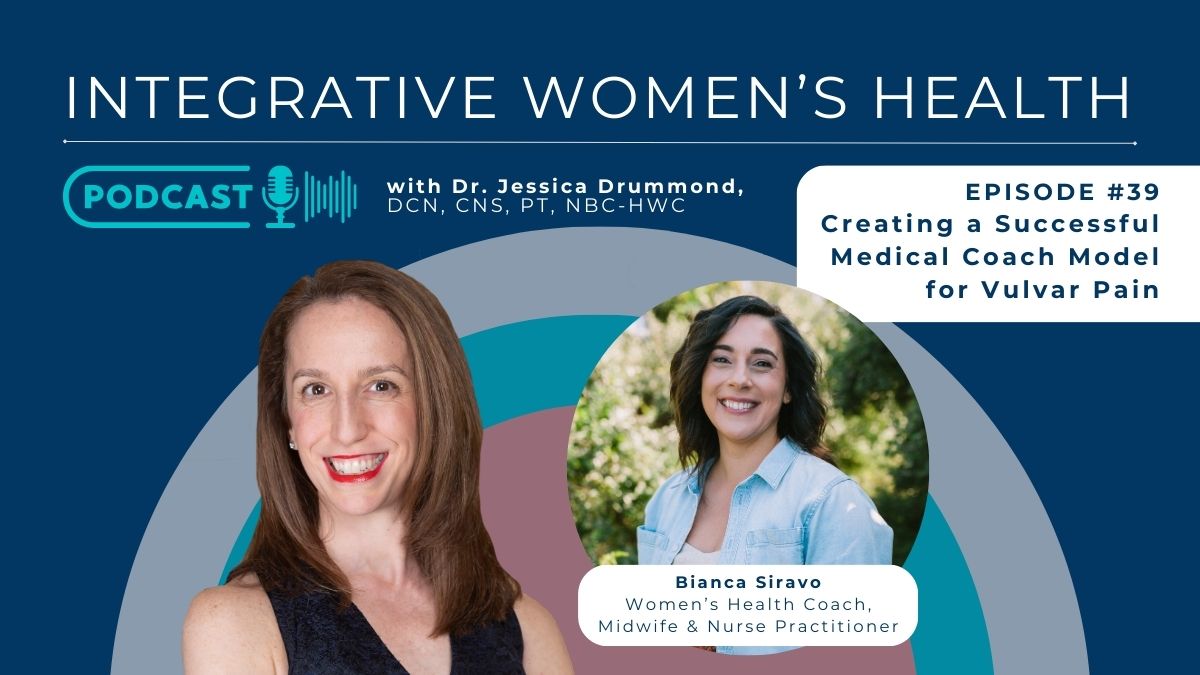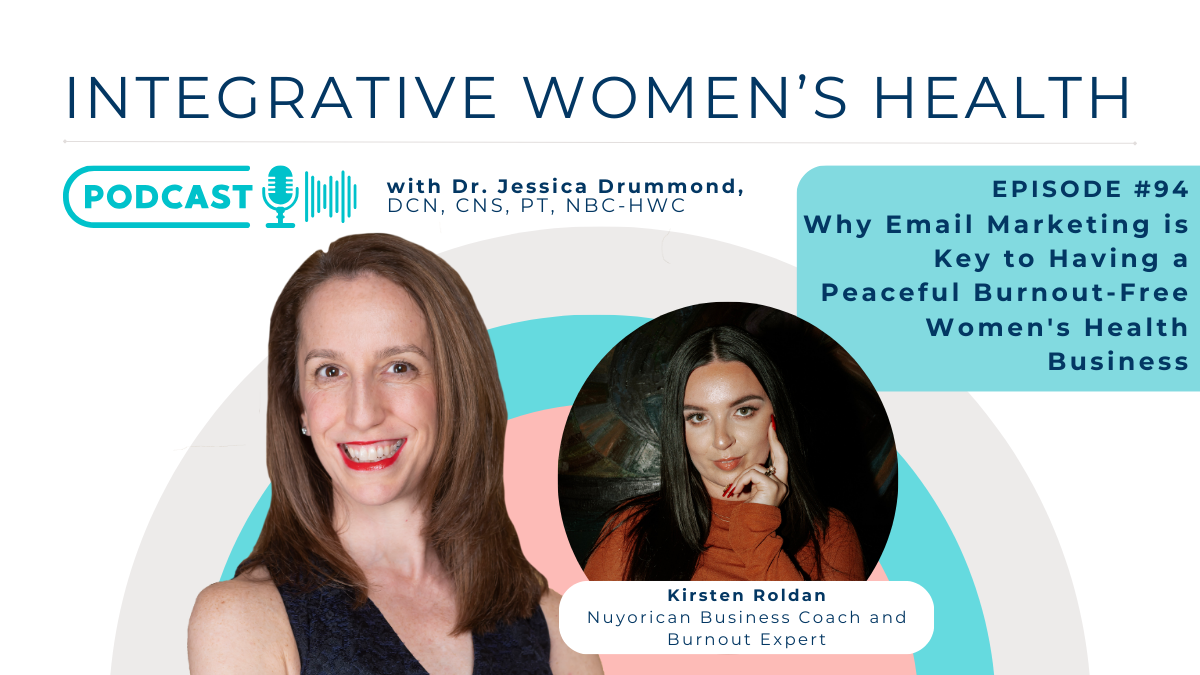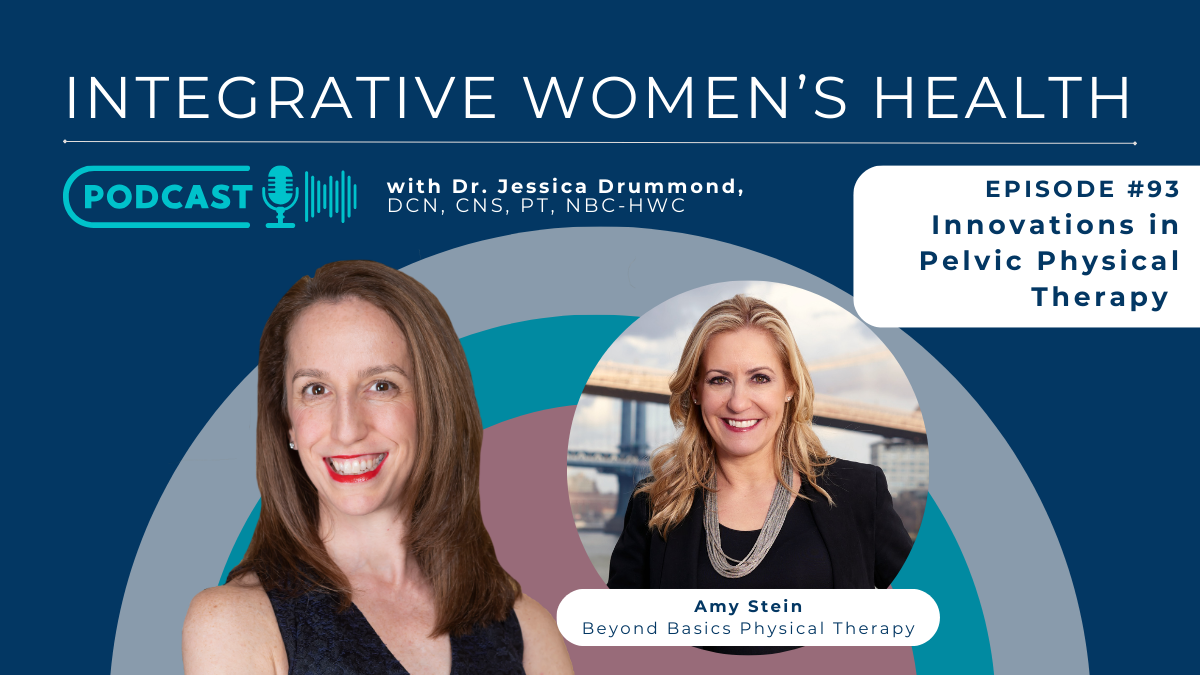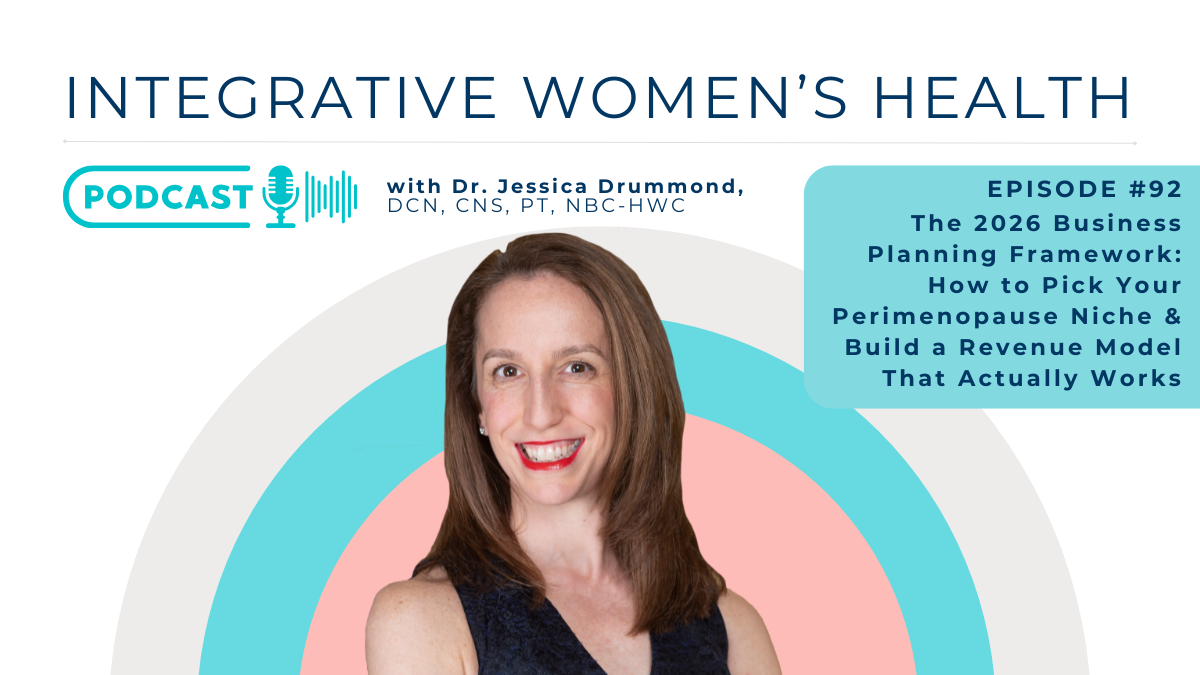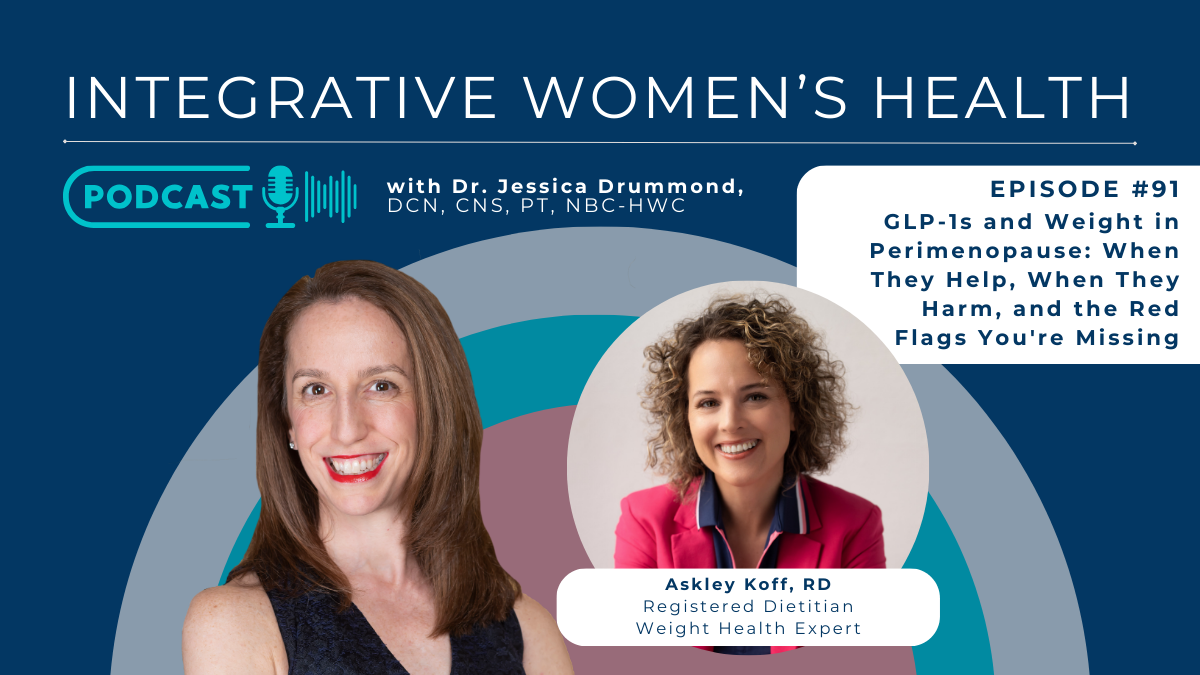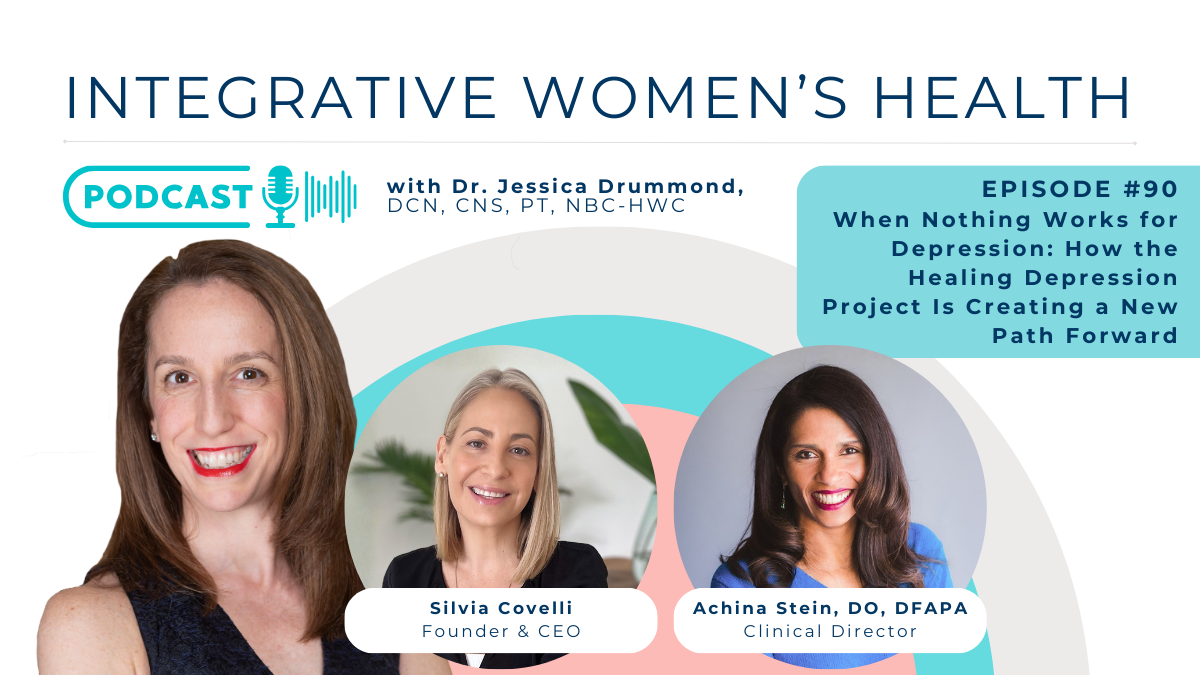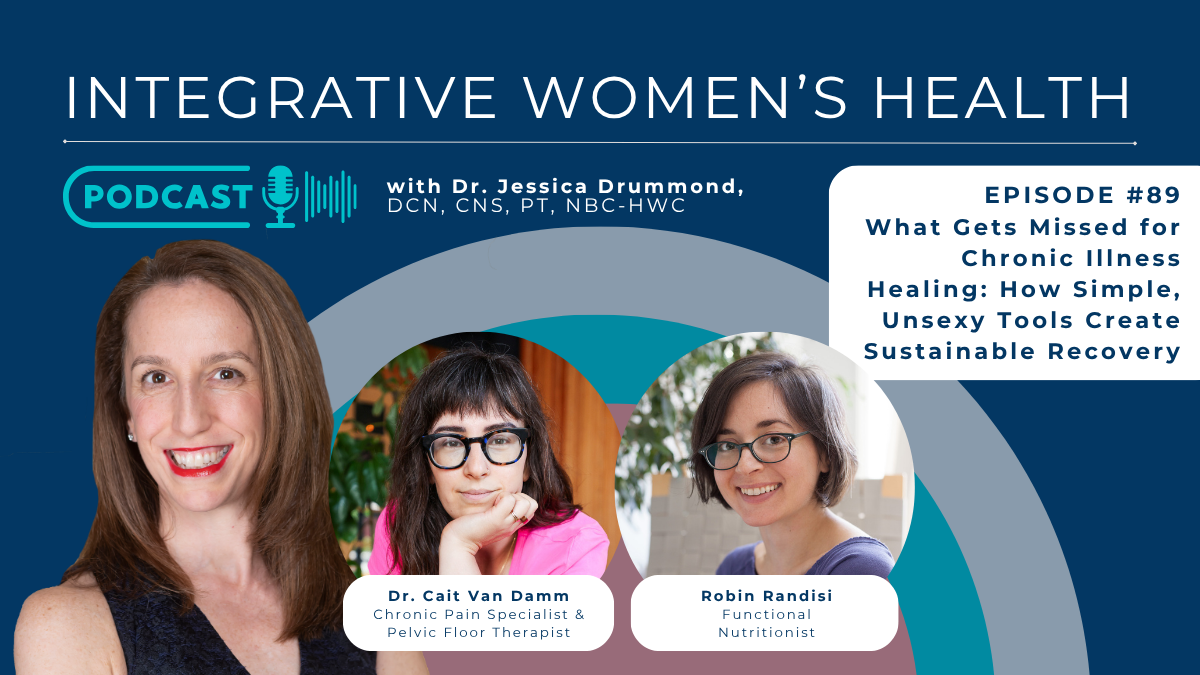Follow Us for Free:
About the episode
“All the coaching skills are important, but without the vision, the rest are really hard to put in place.” – Bianca Siravo
When you’re in a traditional healthcare field, you can feel boxed into a cog-in-the-wheel role. With most clinical professionals having minimal time to interact with clients and patients, visits are rushed, and you simply don’t have time to do the important work of listening and visioning. Instead, clients leave with a checklist of valuable recommendations they often struggle to implement.
For many of our students, this frustration led them to look outside of the current corporate model of healthcare. These hybrid models create a space to combine your clinical skills with your life experience and non-clinical skills to empower patients to have the best possible health outcomes.
Today, I’m introducing you to one of the recent graduates from our Women’s Health Coach certification program, Bianca Siravo, whose personal journey and career experience provide many insights into how a collaborative multidisciplinary team can significantly transform women’s health journeys.
In this conversation, Bianca and I discuss her transition from a traditional clinical setting to a health coaching model, her struggles with pelvic pain, the importance of personalized care, the transformative power of coaching, how coaching and traditional healthcare can work together for the patient’s benefit, and more.
Enjoy the episode, and let’s innovate and integrate together!
About Bianca Siravo
As a seasoned health coach, midwife, and nurse practitioner with over 15 years of experience, Bianca Siravo recognizes women’s unique challenges. Having also navigated the challenges of pelvic pain and dyspareunia (pain with intercourse) for over 15 years, Bianca understands how frustrating, overwhelming, and lonely it can be to walk this path.
Bianca is passionate about coaching and supporting clients experiencing pelvic pain or pain with intercourse on their journey to health and wellness. She provides tools, resources, and support so clients can develop their personal roadmap for health, take steps to reach their goals, and invite more connection, joy, and ease into their lives along the way.
Highlights
- Bianca’s clinical background as a nurse midwife
- The limitations of working in productivity-driven healthcare
- Bianca’s experiences with vulvar pain
- How coaching helped Bianca take ownership of her pelvic health journey
- Making the decision to transition into health coaching
- Getting clear on your vision and how it can guide your future decisions
- The power of hybrid care models for women’s health
- Coaching tools and the added value they bring to clients
- Recognizing the need for clients to lead their healing process
- How coaches help clients overcome barriers on their healing journeys
- The significance of practical experience, community connections, and master coach support
- The role of visioning in healing and personal development
- Mindful listening as a healing skill
Connect with Bianca Siravo
- Bianca Siravo’s Website | InnerEaseHealthCoaching.com
- Bianca Siravo on Instagram @InnerEaseHealthCoaching
- Bianca Siravo’s Facebook Page | Inner Ease Health Coaching
Ready to revolutionize your career and grow your practice?
- Schedule a call with our career coaching team: https://integrativewomenshealthinstitute.com/womens-health-coach-certification-program/
- Integrative Women’s Health Institute on Instagram | @integrativewomenshealth
- Integrative Women’s Health Institute on YouTube
Learn more about The Integrative Women’s Health Institute’s Programs.
Click here for a full transcript of the episode.
Dr. Jessica Drummond 00:00:03 Hi and welcome to the Integrative Women’s Health Podcast. I’m your host, Doctor Jessica Drummond, and I am so thrilled to have you here as we dive into today’s episode. As always, innovating and integrating in the world of women’s health. And just as a reminder, the content in this podcast episode is no substitute for medical advice, diagnosis, or treatment from your medical or licensed health care team. While myself and many of my guests are licensed healthcare professionals, we are not your licensed healthcare professionals, so you want to get advice on your unique circumstances. Diagnostic recommendations treatment recommendations from your home medical team. Enjoy the episode. Let’s innovate and integrate together. Oh. Hi, and welcome back to the Integrative Women’s Health Podcast. I’m your host, doctor Jessica Drummond, founder and CEO of the Integrative Women’s Health Institute. Today, I have a very special treat for you. I’m going to be introducing you to one of our newest graduates of the Women’s Health Coach Certification Program, Bianca Savo. And Bianca is the founder of Inner Ease Health Coaching.
Dr. Jessica Drummond 00:01:31 She comes at the intersection that so many of our new students come from. They are working clinical professionals or just working professional women who realize they are a cog in a corporate wheel and they’re exhausted. They have ten minutes per client, 30 minutes per client. As therapists, they are rushed. They don’t have time to do the important work of listening and visioning. We’re going to get knee deep into that. And she comes with her own journey of pelvic and sexual pain that really informs her current practice. And she could see that while she was getting a checklist of good recommendations, if you will, from clinicians, she was not able to implement them until she worked with another one of our health coaching graduates, Rose Shroff, who was also another wonderful women’s health coach out in the world. So Bianca and Rose, the intersection of their story, Bianca’s clinical journey and personal journey. There are a lot of twists and turns in this one, so let’s get right into the episode. And on the other side, we’ll talk about how you can take a few nuggets from this conversation and implement them right into your practice this week.
Dr. Jessica Drummond 00:03:01 I’ll see you on the other side. Hi there Bianca, welcome. And so for people listening who are like, I wonder if women’s health coaching is for me. Let’s start with your story. Where did you come to thinking about that question for yourself? Yeah, it was a bit of a winding road.
Bianca Siravo 00:03:26 So I am a nurse, midwife and women’s health nurse practitioner and have been practicing clinically since 2018. I was in a very busy outpatient reproductive health clinic working in San Diego. And, you know, it was just one of those really intense jobs. Our patients had a lot of complex needs. We were told we have about ten minutes per visit with each patient. All you heard about was productivity and efficiency. And the mission was wonderful. I think we did provide the best care that we could in the circumstances, but personally, for me, it just didn’t feel like I was being able to care for people in the way that I really wanted to or envisioned when I got into the field of women’s health.
Dr. Jessica Drummond 00:04:17 It’s such an important point, because I think so many people who come to our programs from a clinical background or a corporate background at all, are really seeking a way out of such an intensely productivity driven system because we know intuitively, you know, we’re doing the best we can with the situation that we have, but it’s not the best because it’s being driven by other people’s financial goals, not health care goals. And so most people go into health care with a really strong mission. And yet, almost all of us at some point in our careers get stuck in that kind of environment. I mean, almost all corporate health care environment is that. So you have to actually sort of seek, deliberately step out of it to make a change. So you were in that you were early in your practice, which you know is valuable. You learn a lot, right? But now you’re like, okay, what am I going to do next? What am I going to learn?
Bianca Siravo 00:05:25 Right. And, you know, sort of parallel to my professional journey is my very personal journey.
Bianca Siravo 00:05:32 So I from my very first pelvic exam at age 21, which was excruciatingly painful, and the doctor actually used lidocaine to numb my vagina and then proceed with the exam and then never had a conversation about that after, like, oh, that’s not normal. Or maybe we need to look at this further. There was just no further conversation. First time I had intercourse about a year later with my partner, who has now been my husband and partner of almost 20 years. Was also excruciatingly painful. And eventually we just stopped having intercourse. And I went to nursing school and I got a half a lecture on women’s sexual medicine and sexual health from a very well qualified sex therapist. So I went to go see her because I think I thought, okay, maybe she might be able to help me. And she gave me a link to order some dilator and a piece of paper that said, this is how you use them. And then we did a lot of therapy and talking, which was definitely a component and something I needed to do.
Bianca Siravo 00:06:43 But the actual, you know, physical work and the acknowledgement that there was a physical issue going on and maybe that needed more evaluation wasn’t really brought forth other than the, you know, so go forth and do dilator work. Even at the clinic where I was going at that point as a student to get my gynecological care, they were also using lidocaine. They knew I had painful sex, painful pelvic exams. But again, no one mentioned anything like a specialist or pelvic floor physical therapy. And so finally, once I graduated from the nursing program and I got my masters and we were in Connecticut at the time and then moved out to San Diego for my husband’s job, and I said, I’ve got to figure this out. Like I had an inkling at that point that, like, there would be specialists out there. I had enough knowledge at that point, and I was like, and I also like, can’t live like this anymore, and our relationship can’t be like this anymore. And so I actually found a pelvic pain specialist at UCSD, made an appointment, she did an exam, her Q-Tip exam and said you have what was at the time vestibular Medina.
Bianca Siravo 00:07:51 And now we call it vestibular itis. And learned that it was basically a neurological condition and learned about this vestibular tissue. And then I went to pelvic floor PT in San Diego. And that was really powerful. And I was doing that work. There were delays because Covid happened and all of that. But finally in March of 2021, so 15 years after that first painful pelvic exam, I ended up having a vestibular ectomy surgery to remove that band of tissue around the vaginal opening. And since then, life has been very different, and very positive.
Dr. Jessica Drummond 00:08:32 That’s great.
Bianca Siravo 00:08:33 But I intersected with coaching through that journey. So while doing physical therapy, one of my physical therapists that I work with, her name was Rose Shroff of Be Well with Rose, and she is a former student of this program and had her own growing coaching practice. She was one of the first people, the first person who talked about coaching with me, and then also used coaching in our PT sessions to get me to do my homework because I was really bad, you know, Pts would, you know, basically write a prescription for that week, right? You’re going to do this thing two times, you’re going to do this thing three times, you know, whatever, send me home with the paper and I wouldn’t do it.
Bianca Siravo 00:09:18 I had a lot of emotional blocks around it, you know, it just didn’t seem like anything that was going to bring any sort of fun to my life. It felt kind of like work and miserable, and I was just not, not there. And so Rose was like, okay, like, let’s talk about that, you know, why aren’t you doing your homework? We had a great conversation and we came up with a plan like, I she’s like, okay, well, what? Where would you feel comfortable doing these? The dilator work and what would that look like and when are you going to do it? And, you know, how are we going to hold yourself accountable? And I actually got through the dilator work. This is pre-surgery. And it was really just a different approach. And she coached. That was coaching, right? I was being coached.
Dr. Jessica Drummond 00:10:04 Yeah.
Bianca Siravo 00:10:04 Yeah. And that was sort of my first moment of okay. Like there’s a different approach to getting someone to make progress, you know, in whatever aspect of their health.
Bianca Siravo 00:10:14 So once I had the surgery, rose, actually, I became her client coaching client. And so we really worked through sort of post-surgery, creating just a lot of positive feelings towards my pelvic floor. You know, there was just basically a black box there for so long. Right? I just wanted to ignore it and forget about it. And she really helped me to sort of reconnect with that part of myself in a gentle, loving and positive way and really start opening up about sex and intimacy, which are also things that I had really just shut down. And I also, over the next couple of years, did some groups with her coaching groups that she was holding and got to meet some other women who were going through similar things and did some nervous system regulation work. And so during that process, I was also having this professional sort of fork in the road moment where I was like, okay, you know, I love my job and and working with women and caring for women. I’m very passionate about pelvic pain and women’s sexual health.
Bianca Siravo 00:11:23 I would really like to find a way forward where I can sort of bring this together, and spoke with Rose a lot about it and decided to sign up for the coaching program for your program. And so I was doing a lot of my, like, self work as I was going through your program too, and actually took a break from my clinical job completely for a year. Thankfully. You know, I know that’s not everyone’s story, but I was able to have some financial support from my partner and was able to take that year and really sort of think deeply about what it is that I wanted to do. And I think guiding me through all of that was the visioning work that I had done with Rose at the very beginning of our coaching engagement. That really has been my Northstar for how I want to move forward in my life, with my health, with my professional work, with just my family life. And one thing that came out of that vision was the word ease. I wanted to feel more of a sense of ease.
Bianca Siravo 00:12:29 I think I had been operating for so long, especially in that clinical world, under a sense of urgency. Right. You have to keep on, you know, on time. And then I’ve got to keep up with my home life and my life admin and my relationships and my exercise. You know, it was just this feeling like this constant drive inside to go, go, go and that everything was urgent. And so coming to this sense of ease and this vision and sort of seeing my future self in her cabin in the woods and just having this real sense of ease has then just been, like I said, my North Star about what I’m going to do next. Is it bringing more ease into my life? Is it getting me closer to that vision or not? And that’s really, I think, been such a powerful tool to have. So I know that was a long answer to your question, but it’s been a winding path. These things took time to sort of come together.
Dr. Jessica Drummond 00:13:36 Yeah.
Dr. Jessica Drummond 00:13:36 And I think that’s so true of so many people’s stories. When they look outside of the current corporate model of healthcare, they’re like, oh, there is an option to use all of my clinical skills, all of my skills of humanness, of my story, of my experience. Because even if you had never been a nurse or a nurse practitioner, you still had this personal experience where you then recognize that there’s a way to hold space for people. And one of the things that I think you’ll be familiar with, and that we start the program with having people kind of turn the mirror on themselves, right? Like if they weren’t lucky enough to work with Rose or you or someone before they met us, what is your actual vision? When we start all of our coaching engagements in that way, even if people come to us with sort of a health concern that they’re running from. So like you were trying to get away or get over this vulvar pain, you still had to be tethered to a future vision, right?
Bianca Siravo 00:14:46 Yes.
Dr. Jessica Drummond 00:14:48 So being tethered to that future vision helps people then see, okay, what do I actually want? And my husband always says this. He’s like, how come my guidance counselor never told me there were these, like, jobs where you could do, you know, this kind of work. And I think when you’re in health care, it’s very much that. Right. You’re shuttled into kind of a, you know, cog in a wheel kind of job. And it’s hard to even have awareness that there’s the opportunity to do the kind of work that Rose is now doing that you are now doing. And so as you’ve graduated and you’re transitioning into your health coaching role, what is your vision for your practice now?
Bianca Siravo 00:15:34 Yeah, it has really come into view because we recently had some big life changes. So we moved from San Diego back to Rhode Island, where I am from, and we were able to buy a house, which was part of my vision too. And it happened, and it’s been wonderful.
Bianca Siravo 00:15:53 And we’re closer to family and sort of settling in here. So that was about five months ago. And so coming back to Rhode Island, where I kind of got started, I was a birth doula here. I led group prenatal care classes here as an AmeriCorps volunteer before I went on to nursing school. You know, I’m trying to get a sense of who’s here doing pelvic health, what is my network? And so I have really been using this time to get out there and meet some amazing practitioners and look at some amazing practices in the New England area. And I am starting through that work to figure out what it is that I want to do. And my vision, as it stands today is to actually open up my own medical practice, and whether that’s going to be integrated into a pelvic floor PT practice, which I’ve seen this model happening and it’s just really beautiful. And so I would love to be integrated into something. I think that’s the way that is just the best model of care for women.
Bianca Siravo 00:17:02 But we’ll see how that goes.
Dr. Jessica Drummond 00:17:05 Yeah. And just a quick reminder, we do have in our membership program, we have common guest speakers and people showing their practice models and how they did it. And it’s funny you should say that because it is such a growing, successful model. Vashti Healey, who’s another graduate of our program, is going to be presenting in the membership program in about a week or so. Exactly how she has done that with the physician. So, you know, physician, nurse practitioner, physician assistant, do whatever they’re going to be presenting exactly how they built that model. So I think pelvic rehab coaching nurse practitioner and or pelvic health physician physiotherapist, I think we are seeing more and more successful kinds of models like that, where people get very comprehensive care. And in fact, that’s really what Dawn and I do in our menopause program. She’s a nurse practitioner, I’m a coach and physical therapist and so and nutritionist. I think the key is with any of these kind of hybrid models of coaching and clinical support, is that space? It’s sort of like how the client gets started.
Dr. Jessica Drummond 00:18:19 So, you know, when you were with Rose, you had that space to build out your vision, which is extremely rare. Like if I were to just go to a regular gynecology appointment, even with the nurse practitioner, we wouldn’t have like even 15 minutes to sit down and say, like, okay, you’ve had really challenging, painful sex since the day you started having pelvic exams. Never mind intercourse. Can you even fathom, like, what does a healthy sex life look like to you? And what are some of your thoughts about that? So I think the fact that you bring that lens and now you have the skill set of coaching. So if you think about the skill set of coaching, what feels most valuable to you in terms of the tools you actually learn in this program.
Bianca Siravo 00:19:07 The vision, setting a vision, having that comprehensive view of what it is that you want your life to look like, you know, and health, we know, touches every aspect of our lives and vice versa.
Bianca Siravo 00:19:21 And so being able to really look at the big picture first and zoom out a little bit, I think is extremely powerful. And it was for me. And you’re absolutely right. We don’t do that. And, you know, medical visits and we should we should find a way So that extremely powerful. Also really doing the work of listening in a ten minute visit, you know, you can listen for a couple minutes and that can be powerful. But to really in a coaching model have as much time as you want really to listen. And for that client to be heard and talk through things and be validated, myself, being on the other side of that and having been coached, like I think that is a really underestimated tool and so very needed, especially for women who are struggling with health issues. I think they really need to be heard. And then accountability, having that sort of first creating the map, the roadmap, creating the baby steps, making it very doable, making it fun, and then having that accountability to keep moving forward.
Bianca Siravo 00:20:39 And, you know, if the thing that we said was going to be the next thing that you know to do doesn’t get done, it’s not failure, right? It’s still growth. It’s still moving forward, and it gives us more information. So just being comfortable with letting the process flow and letting the client lead and be empowered to lead, I think is so important. I think a lot of healing modalities and they all have their value and they’re all important, tend to render the client to be very passive. And that’s okay. Sometimes we just need to let ourselves receive. But I think for that lasting inner transformation to live the vision day to day, it does take work or effort and energy, but intentional right to move forward in a way that feels good, that makes sense and that, you know, the client is totally in control of where it’s going to go. So I think pretty much all of the coaching skills, yes, are are important. But I think, that without the vision, the rest is really hard to put into place.
Dr. Jessica Drummond 00:21:54 And I think to circle back to your personal experience, you had a lot of the right pieces in place. You know, the physicians were using lidocaine. The physical therapist were giving you the checklist of correct exercises, if you will. Even your initial sex therapist was, you know, kind of introducing you to the idea of dilator. But the coaching piece where Rose was like, okay, you sort of know what to do. You even have a medical background. Why are you not implementing? It wasn’t about this, like power struggle of like, you’ve got to do your exercises, you know, or like you’re not going to get better. It was like, what are the blocks there? And our clients have lots of blocks. They have interpersonal blocks. They have trauma blocks. They have financial blocks. They have practical blocks. They have fear blocks. And I think this is the good thing about coaching. We have the opportunity to hold space for those blocks, and that allows the client to really figure out what they are.
Dr. Jessica Drummond 00:22:59 Then they have the capacity to hold themselves accountable without like white knuckling it, like, okay, I did my exercises, but they’re not really that effective, right? So yeah. So I think that balance between awareness of what’s holding someone back from being accountable and holding them accountable. So your personal story is just so informative. Your future clients are so lucky, and the state of Rhode Island is so lucky because you can probably touch almost all of it is. It’s a tiny state.
Bianca Siravo 00:23:37 It’s a lovely little tiny state.
Dr. Jessica Drummond 00:23:40 You know someone who just recently lived in Connecticut? We’re not. We’re not that much more powerful. You can probably reach in and touch Connecticut a little bit, too. So everyone up there is very lucky to have you and the network that you’re building around pelvic pain and sexual pain. The need is tremendous. So thank you for bringing coaching perspective to that. Both the medical community and the patients that will be there ready to collaborate with you. Anything else you want to say to someone who might be kind of on the edge about whether or not this program is worth it? They’ve done lots of training.
Dr. Jessica Drummond 00:24:20 They’re just not really sure they want to take that time and invest that money to spend the next 6 to 18 months really doing the work of this program, because it is a commitment for sure.
Bianca Siravo 00:24:33 Yeah. I mean, first I would say, does it fit into their vision? Do they have a vision. Right? And does it make sense in that way? And if they haven’t done any vision work then I would definitely recommend that.
Dr. Jessica Drummond 00:24:46 Well and that’s what our career coaches do. So that’s what Brandee and Kelsey and our whole career coaching team does. So if you don’t have a vision and you just don’t know, schedule a call. And then those guys who are brilliant coaches will help you set that vision for sure.
Bianca Siravo 00:25:02 I love that. And then from there, I just found it to be one of the best investments, honestly, in my career and in my life. There’s a lot that this program offers. It’s so robust. I know you’ve been working on this for a long time, but it’s so meaty for a lot, you know? And the practical tools are there.
Bianca Siravo 00:25:24 And for me, what made the biggest difference was having the hands on practice, the retreats, having a master coach who got it, you know, and was really guiding me through and helping me build confidence and understand my own blocks through the program, connecting with the community and accountability partners who have now become dear friends across the country. A lot of what drew me to clinical practice was being a hands on learner, and I think this program, because it offers the theoretical but also a lot of hands on practice, was absolutely the right choice for me and just a tremendous experience. And so if someone is thinking about it, then I would at least make the call and talk to someone on staff about it. And it really is just a wonderful thing. So yeah. So appreciative.
Dr. Jessica Drummond 00:26:16 Well, thank you so much. And big love to our master coach team and Jake and Dawn who have really helped me. You know, we’ve been doing this program since about 2006 and officially since 2011, so many years under our belt of focusing exclusively on women’s health and pelvic health.
Dr. Jessica Drummond 00:26:38 But the team who are working on optimizing the full retreat experience and making the entire thing accessible digitally to everyone on the planet, no matter where you are with an internet connection and pulling together through orientation sessions and practice sessions and one on one support with the master coaches, I just want to celebrate our team for continuing to make this program more and more robust. So I appreciate all of that feedback, and thank you so much for being a really valued part of our community, because now you get to circle back and be kind of one of the leaders in our membership community and in our broader Iwg community. So we can’t wait to hear from you again in a couple more years so you can share all about your experiences out in the world and good luck to you.
Bianca Siravo 00:27:35 Wonderful. Thank you Jessica so much. It’s really exciting to be a part of this really wonderful. Thank you.
Dr. Jessica Drummond 00:27:47 What a story. So many of us have these personal healing journeys and career journeys that are so twisty and turny. If after this conversation you’re like, oh, I don’t know what’s next for me in my career, but I know what I’m doing right now, is not it? Your next step is to schedule a call with our career coaching team.
Dr. Jessica Drummond 00:28:09 They are highly skilled coaches that will help you find the next step in your career journey. And I’ll make sure the link is in the show notes to schedule a call with our career coaches. In the meantime, let’s pull together some of the nuggets from this conversation that you can take and use in your practice. One we really focused on the coaching skill of visioning in this conversation. It was so valuable to Bianca’s personal journey, career journey, healing journey, even relationship journey, even figuring out where she was going to live. So if you have not taken a moment to sit down and vision with a health coach, with a coach who’s highly skilled in these tools of visioning, reach out. Reach out to us. Reach out to Bianca at Inner Ease Health Coaching and spend the time to build out your vision. Now is the exactly perfect time to build your health and life vision, because these two things cannot be separated. Building your vision is the key to what the next steps are for you. Our career coaches can help you with that.
Dr. Jessica Drummond 00:29:29 We’re here to support you. It’s very important that we have a vision around healing because as you could see for Bianca, it took her more than a decade to really solve her sexual pain, her vulva, her pain. Because while clinicians were giving her sort of the checklist of correct things to do, they were not grounded in a vision of what it could feel like if she was living from a place of ease rather than a place of urgency. And this is such an important distinction, and it can accelerate your healing journey, your career journey, your opportunities, exactly how you create your life. And that skill set of visioning is something we don’t intuitively know. That’s why we have to learn the skill set of coaching and then mindful listening. So if you are in a setting where you’re working with patients or clients this week. Take the opportunity. Even if you’re in a hustle bustle kind of practice, you have seven minutes, ten minutes with your clients. Slow your breath. Lower the tone of your voice.
Dr. Jessica Drummond 00:30:43 This is actually part of the skill set, and then open your mind to listen with no intent to respond. So the skill set of active listening has underneath it a sense of curiosity without a need to respond. So you’re mindfully listening with full curiosity and openness. And you have to be physically very grounded to be able to do this, because we’re taught to, you know, be kind of already thinking of our response to be disproving or proving or, you know, we always have kind of a intention behind our conversation, mindful listening like that for just 2 or 3 minutes where you have this fully open beginner’s mind, but your voice, demeanor, and nervous system are very grounded is such a healing skill in and of itself. So try it. See where it feels easy for you already. See where it feels hard. See where you’re like, I have no idea how to do this. That is all good. It’s part of the exploration. And then if you’re ready to explore what could be next for you in your practice, reach out to our career coaching team.
Dr. Jessica Drummond 00:32:02 And if you are anywhere in New England struggling with pelvic pain, sexual pain relief, our pain, any other kind of pelvic health issue, absolutely reach out to Bianca. She is very well qualified as a midwife, as a nurse practitioner and now as a women’s health coach, and you will be in such good hands with her. And notice she’s already building that collaborative, multidisciplinary team for you to work with. So reach out. We’re all here for you. Practice those two skills this week. Visioning for yourself. Mindful listening for the people in your life. I’ll see you next week. Thank you so much for joining me today for this episode of the Integrative Women’s Health Podcast. Please share this episode with a colleague and if you loved it, hit that subscribe or follow button on your favorite podcast streaming service so that we can do even more to make this podcast better for you and your clients. Let’s innovate and integrate in the world of women’s health.
Join Dr. Jessica Drummond to learn the three key steps to becoming a successful, board-certified Women’s Health Coach who leaves a lasting positive impact on their clients.
Learn how utilizing health coaching skills in your practice is crucial to your success, leaving a lasting impact on your clients, and shifting the paradigm of women’s healthcare.

Dr. Jessica Drummond
Founder & CEO
The Integrative Women’s Health Institute
At the Integrative Women’s Health Institute, we’ve dedicated 17 years to crafting evidence-driven, cutting-edge programs that empower practitioners like you to address the complexities of women’s health.
Dr. Jessica Drummond’s unique approach focuses on functional nutrition, lifestyle medicine, movement therapies, nervous system dysregulation, trauma, and mindset – essential elements often overlooked in traditional health education.
In addition, your training will be fully evidence based, personalized, and nuanced (this is not a cookie cutter approach) in functional nutrition, exercise, recovery, cellular health, and all other lifestyle medicine tools.
You’ll learn to support your clients with cutting edge tools safely and effectively.

